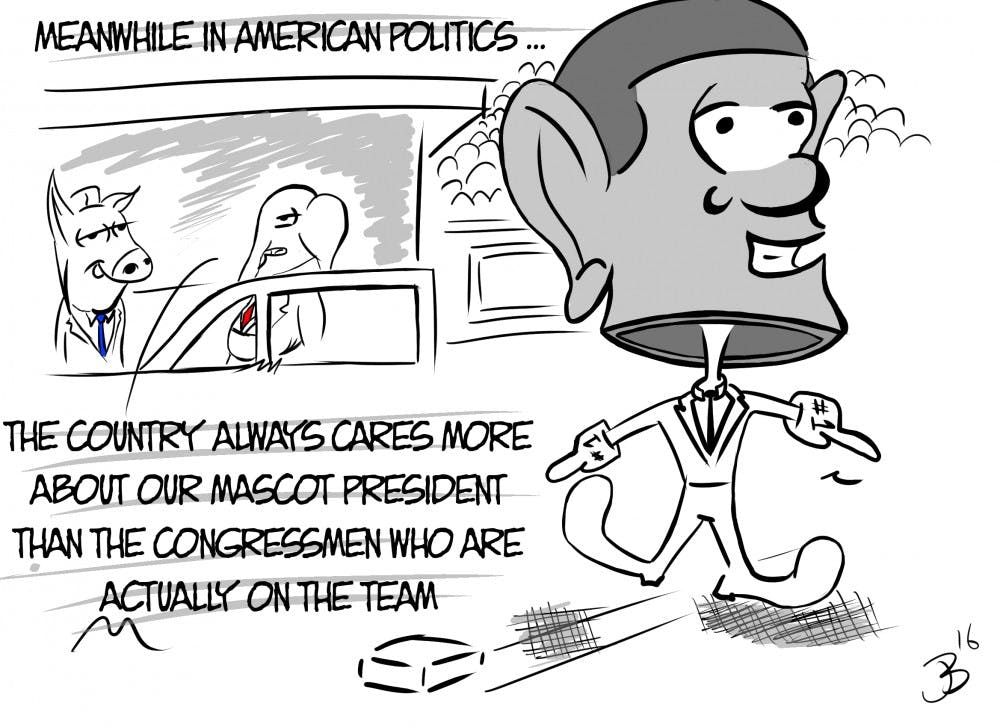With one signature or a veto, the president has the power to pass or stop a bill — but that is about the extent of his power of legislation. The president does not, however, have the power to formally write, amend, or vote on it in the U.S. House or Senate. In order for a bill to pass, it needs the votes of 51 Senators, and 218 Representatives.
Yet, surely your Facebook feed has been flooded with Bernie Sanders, Donald Trump or Hillary Clinton (ft. Gary Johnson) posts.
While many Facebook users will vie to prove their political savvy with their pro/anti (insert presidential candidate name here) rhetoric, you need only ask them one question to see if they are truly worth listening to:
“So what Congressional and legislative district do you live in? Who represents you?”
While the presidential race makes noise, the state legislature, along with members, of U.S. Congress initiate change. Talking about the presidency is fine, but the issues you care about will be debated by the other people on the ballot.
It seems every election year people believe that the president will change everything for them. Indeed “Hope,” was one of Obama's slogans for his ’08 campaign, an election he won handily. However, Obama supporters found themselves disappointed in 2010 when the Democrats lost the U.S. House and were unable to pass significant legislation such as immigration reform or gun control measures.
Understandably, many Bernie supporters were disappointed this week as one of the most significant and surprising runs in U.S. history came to an end with Bernie’s endorsement of Hillary Clinton, stating that she would be “the presumptive nominee.”
Had Bernie Sanders won the the election, many would have been disappointed because if the U.S. Senate were under Republican control, he may not have been able to appoint a progressive Supreme Court Justice. President Obama is going on 4 months without even having a hearing for his nomination for the highest court in the land.
There seems to be this kind of hope that our government is a top down system, but without a doubt, it is a triangle, and each piece has checks and balances on the other.
Even Bernie Sanders himself called on people to start running for local office by stating, “We need to get people running for office at every level of government.” He understood the enormous impact that other offices meant for his "revolution."
On the other side of the aisle, many people found themselves scratching their heads wondering why Paul Ryan wasn’t running for president. Obama poked fun at the question during his final Correspondent’s dinner, when he laughingly said, “Guest were asked to check whether they wanted steak or fish, but instead a whole bunch of you wrote in Paul Ryan.”
Well the answer probably lies in the the power he holds as the Speaker of the House. He can himself put a stop to bills just as the president can. If he doesn’t assign a bill to a committee, the bill is dead. Bernie’s free college bill? Dead in the House. Free Healthcare? Dead in the House. I think you get the point.
We need to remember the president only holds a single vote on the condition of if the first 535 votes approve it, and debating it over Facebook with people who have already made up their minds would be in Pokemon Go terms “ineffective.”
If passing legislation in D.C. was a firework, the President would simply be the fuse, but Congress is the explosion.
Talking about issues, legislative races, local Congressional races, and even statewide U.S. Senate races have a bigger impact, because more people are undecided.
For some here in Arizona, the presidential race has left them feeling a bit left out. The good news for them is there are plenty of other important key races in our state at hand that deserve attention.
Long-time Sen. John McCain (R-AZ), and rising Rep. Ann Kirkpatrick (D-AZ) will be dueling it out in the desert, as this race will be a key factor in which party controls the U.S. Senate. A victory for Kirkpatrick may mean the Democrats regain control, and a victory for McCain may help Republicans maintain power.
Looking over their platforms and what they believe is an important step in deciding who you will vote for. Once again, bills in the Senate could be decided one or two votes, and this duel in the desert means more to the Senate, than it does to the presidential candidates.
For the state legislature there are three key senate races, but none more important than that of Legislative District 28, where Reps. Eric Meyer (D-Paradise Valley) and Kate Brophy-McGee (R-Paradise Valley) will fight for the seat that will most likely be the deciding seat on who controls the Senate in the next legislative session.
If the Democrats pick up an easy seat where Sen. Begay is vacating, they only need two more wins over Republican incumbents to draw the State Senate to a tie, and force compromise on bills.
It’s important to note the importance of the State Legislature in regards to university funding, as they effectively cut $99 million away from universities two years ago, have cut a total of $455 million since the Great Recession, which has resulted in over an 85 percent tuition increase since then.
It's on us to make our voices heard not only in the presidential race, but every race because they all affect us. If we want to see true lasting change for the beliefs we hold, we have to go deeper than one vote.
Want to join the conversation? Send an email to opiniondesk.statepress@gmail.com.
Keep letters under 300 words and be sure to include your university affiliation. Anonymity will not be granted.
Like The State Press on Facebook and follow @statepress on Twitter.




